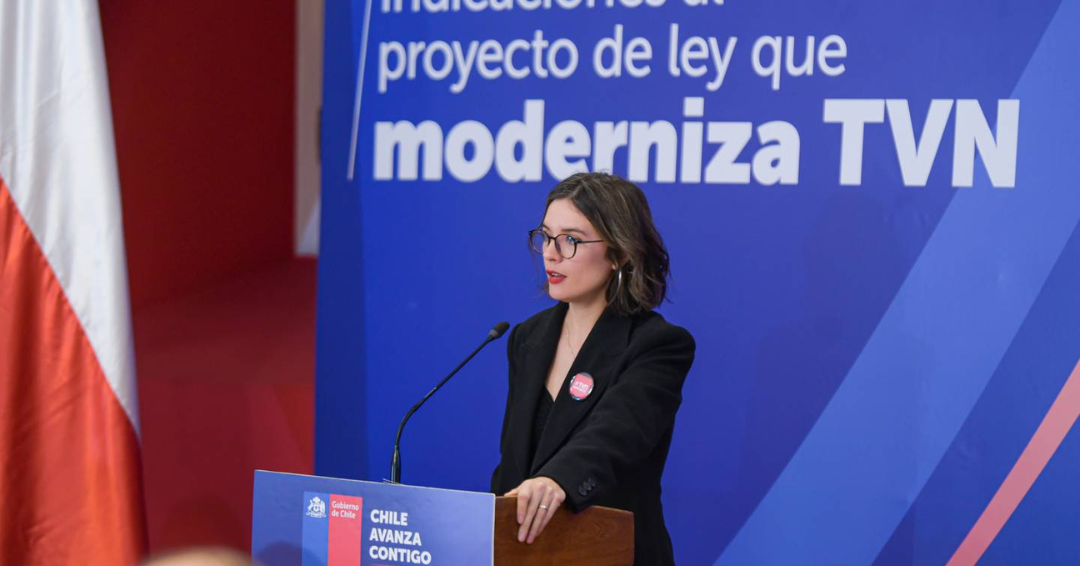- • We attended the presentation of the indications to the bill that seeks to modernize the state public channel TVN
On July 12th, Minister Secretary General of Government Camila Vallejo Vallejo presented the indications to the bill submitted in March 2022, which modernizes Televisión Nacional de Chile (TVN).
The indications announced by the government’s spokeswoman revolve around four pillars: modernizing the public mission, modifying the board’s structure, establishing a financing structure and updating the economic regime.
The event was held at the Montt Varas hall of La Moneda Palace and was attended by the president of the public channel, Francisco Vidal, in addition to various ministers, actors, prominent journalists and members of parliament.
In this regard, Francisco Vidal was emphatic in claiming that if the public channel’s economic regime, which is currently mainly financed through advertising (just like nationwide commercial channels), does not change, TVN will not be able to continue its functions.
Indeed, Law 19.132 stipulated that the public channel may not commit public credit or funding, loans, contributions or subsidies, securities or guarantees from the State or any of its bodies, entities or companies in order to support itself under equal conditions with the private sector, although Law 21.085 of 2018 entailed a substantial injection of resources under an argument similar to the one posed by Francisco Vidal on this occasion.
The state broadcaster currently consolidates a debt of 50 billion pesos, which has been increasing since the 2000s. This economic crisis has meant the dismissal of hundreds of workers and constant questions about the quality of the programs produced by the channel.
Although it is appropriate to address the financing mechanism and incorporate state participation to continue the state broadcaster’s operations, the issues that emerge from the legal bodies that regulate it are deeper and more diverse.
The “Public Mission”
During the first discussions of Law 21.085 of 2018, the bill defined the concept of public mission as the promotion of diversity, cultural and regional development, national and international integration, and the population’s civic education. However, despite the fact that this law incorporated the discussion of a bill submitted to Parliament in 2008, after 10 years of processing, it was decided not to include a precise definition of the state broadcaster’s public mission.
Conversely, the law did stipulate that the public channel“shall safeguard the effective fulfilment of its public mission, which includes promoting and disseminating democratic values, human rights, culture, education, citizen participation, the national identity and regional or local identities, multiculturalism, environmental care and respect, tolerance and diversity”.
The problem with this definition or the principles connected with the concept of public mission is that they are almost identical to the concept of proper functioning overseen by the National Television Council for the entire television system. In other words, public television is stripped of a specificity or differentiation regarding the rest of the television system.
Just like the self-financing that currently governs TVN, its public mission suffers from a lack of differentiation that prevents providing the public channel with a particular and specific role compared to the other television typologies that make up the media ecosystem.
(*) Jorge Avilés is a journalist, researcher of the Observatory of the Right to Communication and research assistant for Convergent Regulation.
** We are attaching the presentation “Commercial Sustainability and Public Interest Contents? Critical Assessment of the New Policies for Financing TVN”made by the academic and researcher Chiara Sáez and Jaime Mondría at the II Ibero-American Seminar on Cultural Economics held in Valdivia in 2019. It summarizes the legal framework’s limitations regarding TVN’s financing after the last reform of the public television law in 2018 (Law 21.085) and can serve as a reference for the new legal reform that has just been announced.
Ecocult_Valdivia_VF_Definitiva

